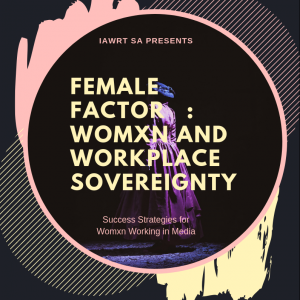Gender Mainstream Project Taking Off
- Making women safe to do the best stories covering gender-based violence – Norway.
- Examining the extent and scope of sexual harassment in Cameroonian newsrooms
- Strategies for achieving gender equality in Iraq-Kurdistan media organizations
- Digital safety of journalists in Kenya
- Workplace strategies for women in South African film
- #Metoo Nepal for media students & improving women’s representation on media
- Uganda creating a pool of Gender Mainstreaming Ambassadors.
- Sexual harassment prevention in the Indian film industry
The Gender Mainstreaming Project (GMP) supported by FOKUS and UNESCO-Norway, is the largest activity conducted by IAWRT in 2018 and into 2019. details here. A new handbook on best practices for fully integrating gender perspectives into media policy – focusing on southern and eastern Africa and India – will be released in 2019. Locally tailored workshops, training, demonstrating and assessing best practices were run by chapters around the world in 2018.
Uganda
Re Discover to Re Impose – Building a Sustainable Pool of Gender Mainstreaming Ambassadors by Nankwanga Eunice Kasirye
Building a lasting pool of gender mainstreaming ambassadors through mentorship. requires re discovering one’s potential to re impose for opportunities to create a gender-fair environment in newsrooms and on the media. The Re discover to Re impose gender mainstreaming workshop n Kampala in Dec 2018 introduced the pioneer ambassadors to gender as a concept in the media, as well as the legal perspective.
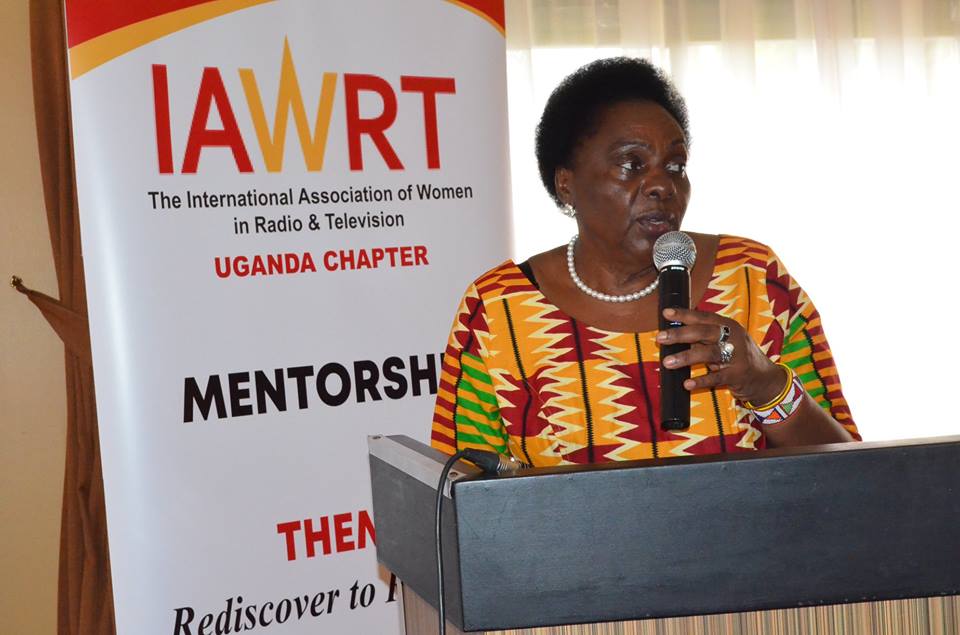
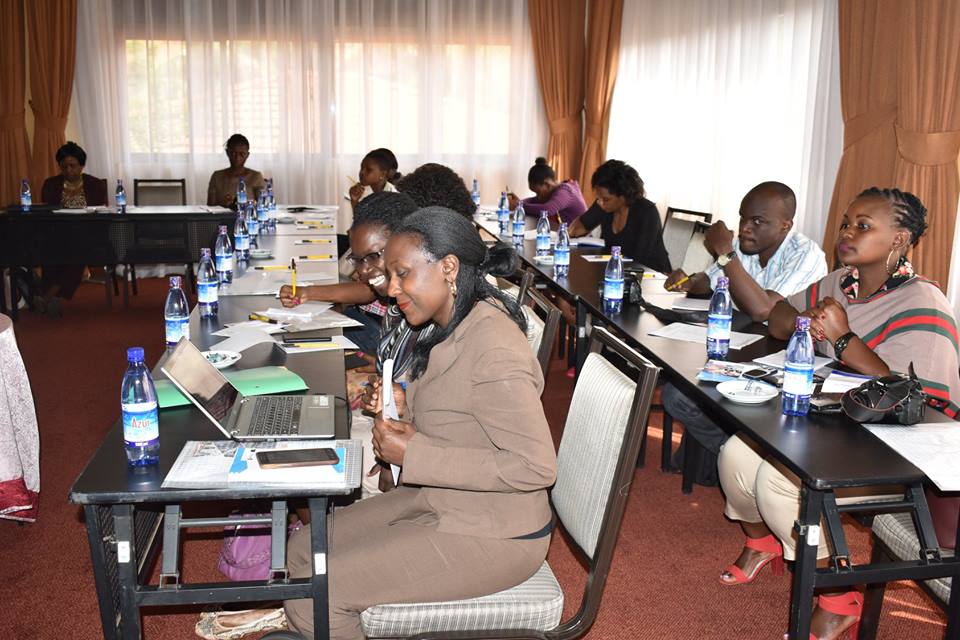 The undesirable trends in media research statistics – where only 20% of Ugandan women were quoted as news sources in election stories and only 28% of Ugandan women were news subjects – mostly lighter topics – prompted IAWRT Uganda to engage with news editors and senior journalists about gender mainstreaming in the newsroom.
The undesirable trends in media research statistics – where only 20% of Ugandan women were quoted as news sources in election stories and only 28% of Ugandan women were news subjects – mostly lighter topics – prompted IAWRT Uganda to engage with news editors and senior journalists about gender mainstreaming in the newsroom.
That gave birth to the IAWRT-Uganda’s Re discover to Re impose, mentorship of gender mainstreaming ambassadors. A pioneer group of ten mentors and twenty mentees will champion the gender cause in the media.
Through mentorship, media practitioners, especially women, get back to the drawing board and re-evaluate their potentials and weakness, identify their opportunities and the threats that lie ahead in their career struggles. Women then moving into the space of positive impact or opportunities, or positions of power and authority can reduce the negative portrayal of women in the media.
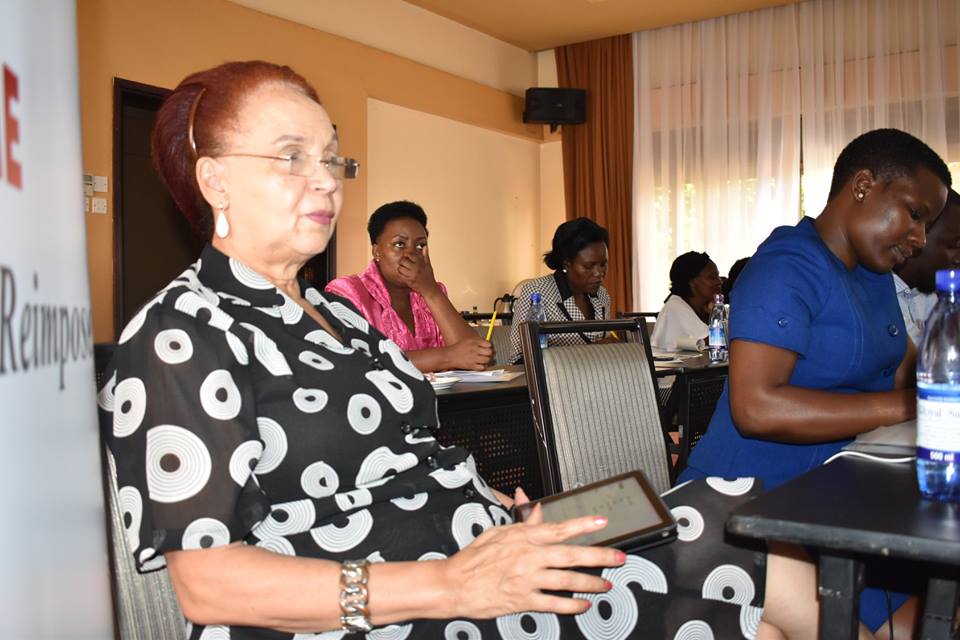
Prof. Maggie Kigozi, the patron of the IAWRT Uganda chapter, challenged the female journalists to work together and support each other, to build credible networks and determine to look out for female achievers to put their stories in the limelight.
Uganda’s first Professor of Journalism, Nassnga Gorreti, of Makerere University, says IAWRT mentorship should be able to improve the positive portrayal of women in the media, the number of women in decision making positions within media houses and open up opportunities for career excellence.
Caroline Idembe, a human rights lawyer, explained the need to understand legal redresses and its limitations, in order to gain job positions that matter. She says the UN agenda 2030, which calls on government funds to be spent for gender equity and women’s rights, needs to be fully monitored by a media which is well skilled and equipped with the legal and policy frameworks.
IAWRT-Uganda’s intention is to ensure that the pioneer ambassadors become well versed with these concepts in order to become trainers of trainers. We want the pioneer team to form a well informed force in the media which can be used for reference. We require continuous in-depth training on the same for our ambassadors to light the candles whereever they work or operate from.
South Africa
Female Factor: Women and Workplace Sovereignty – Success Strategies for women in the field, on sets, online, in radio and in newsrooms by Makganwana Mokgalong
The South African chapter’s focus with the GMP has always been to simplify things: To make it all about what the everyday woman working in media can grasp and apply in their day to day roles. So in early December, at Sonke Gender Justice we held an all-day dynamic workshop for a primary target audience of young women and other established practitioners. Katlego Nakedi a feminine empowerment coach led a powerful session of raising personal awareness around fear and how women can transcend their fear in order to master their expression. She shared tools and practices that women can use to resolve their fear and stand for themselves in the workplace and in life.
Zoe Ramushu a legal consultant, activist and producer and representative of www.swiftsa.org.za, shared the work that Sisters Working in Television and Film (SWIFT) is doing for women in TV and film. They’re doing research around harassment and sexual abuse in the industry. This research is key in calling for protective measures for women on sets. Zoe made the women aware that they can call a SWIFT representative who can help them file a case and offer support by following up to see that the perpetrator is brought to book. SWIFT is also working on industry guidelines to make safety officers mandatory on sets.
Some participants had trauma from abuse and a sense of powerlessness in an environment where disciplinary measures for perpetrators aren’t as stringent as they are in traditional work environments. However, the learning demonstrated how women can find power in the moment of abuse to stand up, speak out and push back when it is safe to do so. Some of the women reported that they now see how they could have better handled some of the abusive situations they’ve had to endure.
I am a screenwriter by trade, and my session showed two films to open up a discussion around characters, story and language. They were from the South African National Film and Video Foundation, Female Filmmaker Slate – A Groom’s Price and Ganesh Falling – very different works that illustrate that the female story isn’t as monolithic as mainstream film makes it out to be, that women from different backgrounds can have different narratives.
We focused on creating awareness around diversity and not trying to compress women’s stories into one story. What also became stark was how women bring their oppression into their craft, not from an enlightened perspective but from past trauma. What came out of this session was an affirmation that all stories are valid and agreement that how we want to be seen and heard as women is not perpetuating what continuously disempowers us. Click for full story.
Norway
“Many of the best stories covering gender-based violence are done by women journalists, However, women journalist themselves face safety threats that can risk their numbers in the journalistic field” by Kristine Ramm, Norway
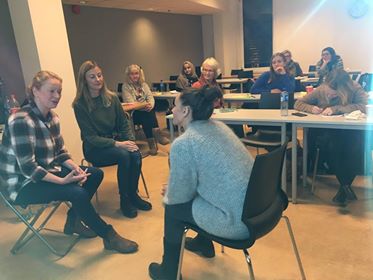
Abeer Saady, the Vice President of IAWRT says this often in her training workshops, as she did in Olso in early November. As a part of the Gender Mainstreaming Project (GMP), Saady, from Egypt, gave a workshop at the OsloMet University in early November.
Abeer is one of IAWRT’s sparkling jewels, and a big asset to our organisation. She travels the word giving safety training workshops of different durations, often without getting paid, always promoting IAWRTs name. Her skill as a media consultant and safety trainer is widely recognized and appreciated. She shares from her own experience as a war correspondent with 28 years of professional experience in covering conflict zones within the Middle East, Africa and Asia. This time in Norway she addressed her advice to female journalists covering conflict zones or reporting on sensitive gender issues.
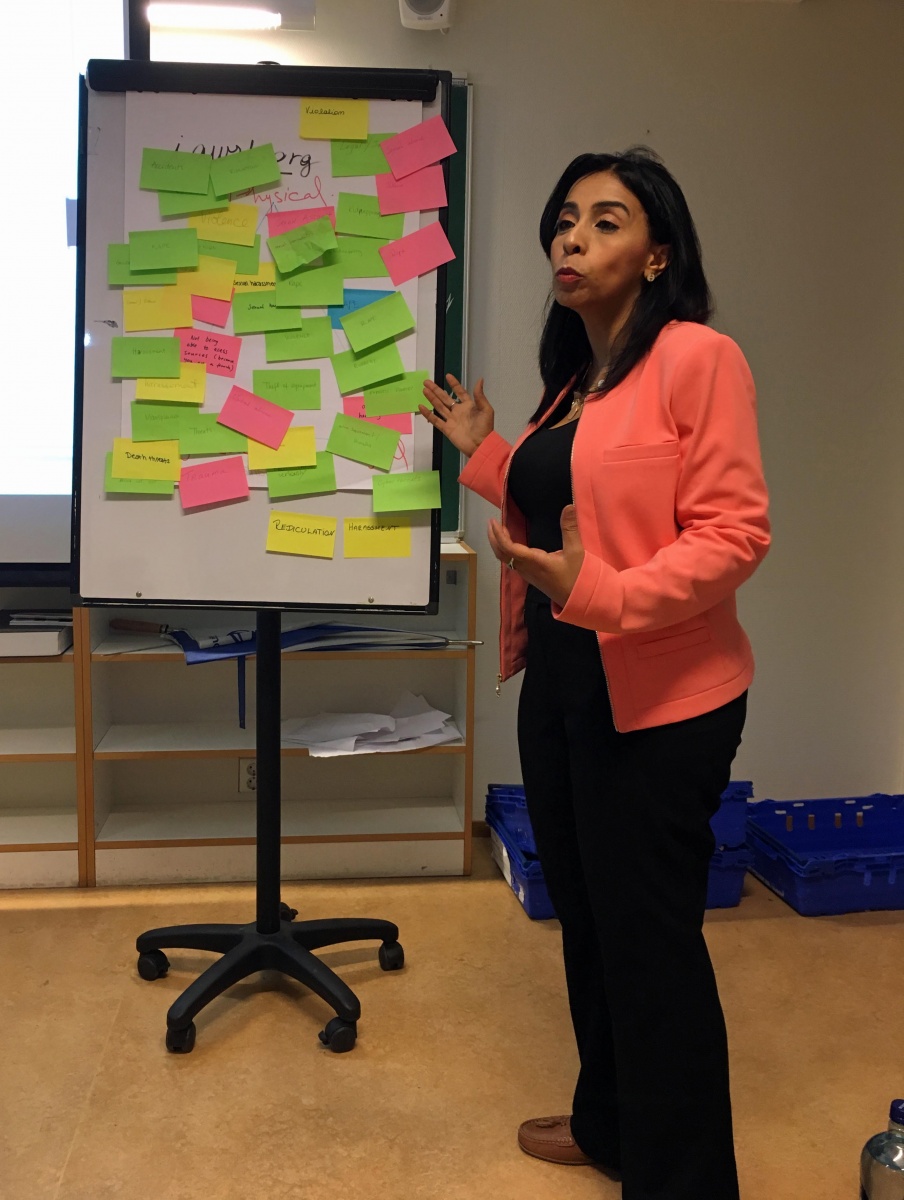
Some of her practical advice: Keep your social media sites clean, never lie: Keep private items off your public profile; Do not share information that can be used to harm you or your close ones; consider having two Facebook profiles; Be sure that your passwords differ and not contain obvious combinations; Never post that you are about to enter a conflict zone.
Participants received hands-on advice about precautions when covering crowded events and demonstrations. Even though this advice can be read in the IAWRT safety handbook for female journalists, Abeer’s advice and examples become somewhat more realistic when demonstrated face-to-face, combined with examples from real life cases.
As she often does in her workshops, we were facilitated into role plays, to engage us in realising good and bad practices when interviewing victims of accidents or violence. These exercises give participants good hands-on experience about the ethical responsibility journalists must respect in our sources in vulnerable situations. As explained in the handbook these practices are also a safety measure to protect the mental health of the reporter herself.
With additional funding from UNESCO-Norway, a handbook based on earlier phases of IAWRT’s GMP surveys, research and workshops to identify best practices for gender equality in the media from India and southern Africa is now being written by Greta Gober. In this video, researcher Ann Mabel Sanyu explains the project.
The handbook is due to be launched at IAWRT-Norway’s second GMP event IN 2019.
Cameroon
End sexual harassment in the media in Cameroon #PressforProgress #Metoo #Hearmetoo #237stopsexualharassment #stopGBV by Becky Bissong
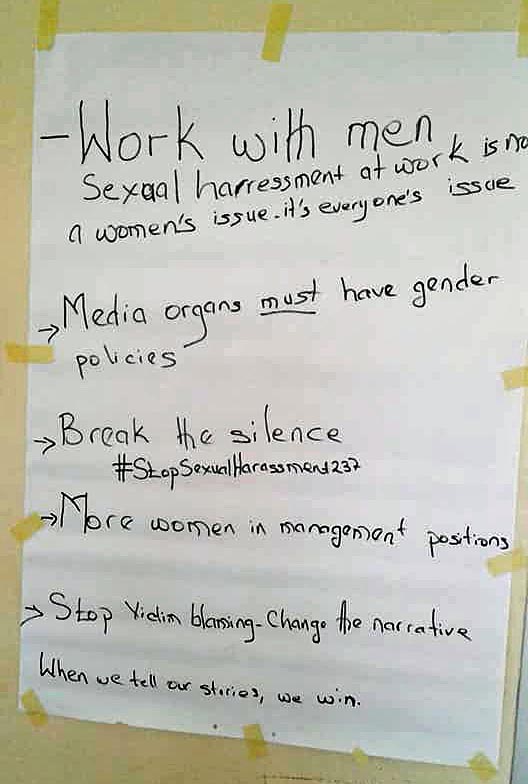
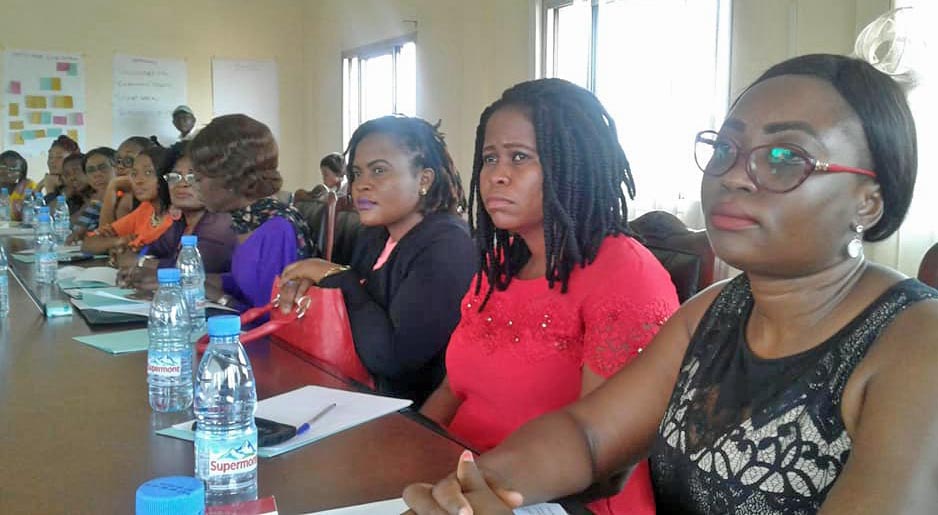 Over 50 media women from public and private media enterprises in Cameroon attended a workshop that formed a plan of attack on sexual harassment in their workplaces.
Over 50 media women from public and private media enterprises in Cameroon attended a workshop that formed a plan of attack on sexual harassment in their workplaces.
The scope and depth of the problem in newsrooms was outlined by Comfort Mussa, a journalist and activist. With 8 out of 10 women in media saying they had been harassed, it was glaringly clear that it is so prevalent in Cameroon’s media, that it is generally considered “normal”.
Comfort regretted the fact that despite those numbers, even media women do not speak out against such gender based violence because of the fear of stigmatisation and ignorance of the law. She noted that the situation was getting worse because of the lack of gender policies in media enterprises.
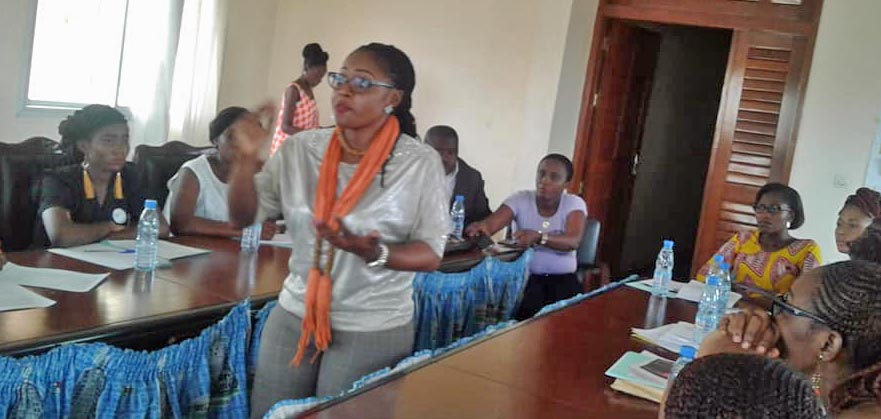 There was extensive discussion on the many overt and covert forms of sexual harassment in newsrooms and its impact on careers through stress and trauma and the labelling of media women who do not give into it. Florence Mvondo Mbezele, from the Ministry of Communication shared information on laws and international conventions, which are available to be used to uphold and protect media women’s human rights.
There was extensive discussion on the many overt and covert forms of sexual harassment in newsrooms and its impact on careers through stress and trauma and the labelling of media women who do not give into it. Florence Mvondo Mbezele, from the Ministry of Communication shared information on laws and international conventions, which are available to be used to uphold and protect media women’s human rights.
Media women at the gathering resolved to continue collecting valid data on the extent of the problem, to encourage support networks for women who speak out, and to campaign and work to ensure the development and implementation of gender policies to check sexual harassment and enforce respect for the journalists’ code of ethics in Cameroon.
Iraq
Debate: Eliminating Gender Discrimination in Media Binay Shorsh reports from Sulaymaniyah
As part of the global 16 Days of Activism Against Gender-Based Violence Campaign, which began on November 25, the IAWRT Iraq-Kurdistan chapter organized a special seminar on gender equality in media organizations, which debated the status of women in the media and the problems they faced because of their gender. It also highlighted women’s media capabilities for achieving their goals.
Prominent women journalists and media reporters in the Kurdistan Region attended at the Hotel Titanic in Sulaymaniyah City in early December. Lava Kurda a spokeswoman for IAWRT-Iraq said, “We have gathered today to participate in dialogue and consultation on achieving equality between women and men in media organizations and to talk about our role as women in achieving equality and renunciation of violence and discrimination, through our work and by demonstrating our competence and ability to work.”
According to the discussion, many media women do not support each other, especially when they achieve high positions. Susan Anwar, a journalist, said there needs to be a return to basics before defending media women’s rights, ‘We basically do not understand what our rights are … the majority of women fight them instead of supporting them,” she said.
One of the participants, Shna, a teacher and journalist, suggested that women journalists needed to raise awareness about their rights, duties and about what violence is. “I work in Metro Center, unfortunately, women never complain about taking their rights, while only men and young people come to claim their rights.”
On the other hand, the journalist Rawshan said: “We have to separate the political and Islamic consciousness and the policies that have been exposed to the Kurdish people throughout history, Kurds have no state of their own; the orientalists who visited Kurdistan spoke admiringly about the role of Kurdish women in the community. To get out of the cycle of Islamic stereotypes and customs and traditions imposed on us, we need to work to support us being strong Kurdish woman and coming out of the framework of customs and traditions imposed on us by other people.”
Kenya
One day workshop on digital safety of journalists by Cecilia Maundu
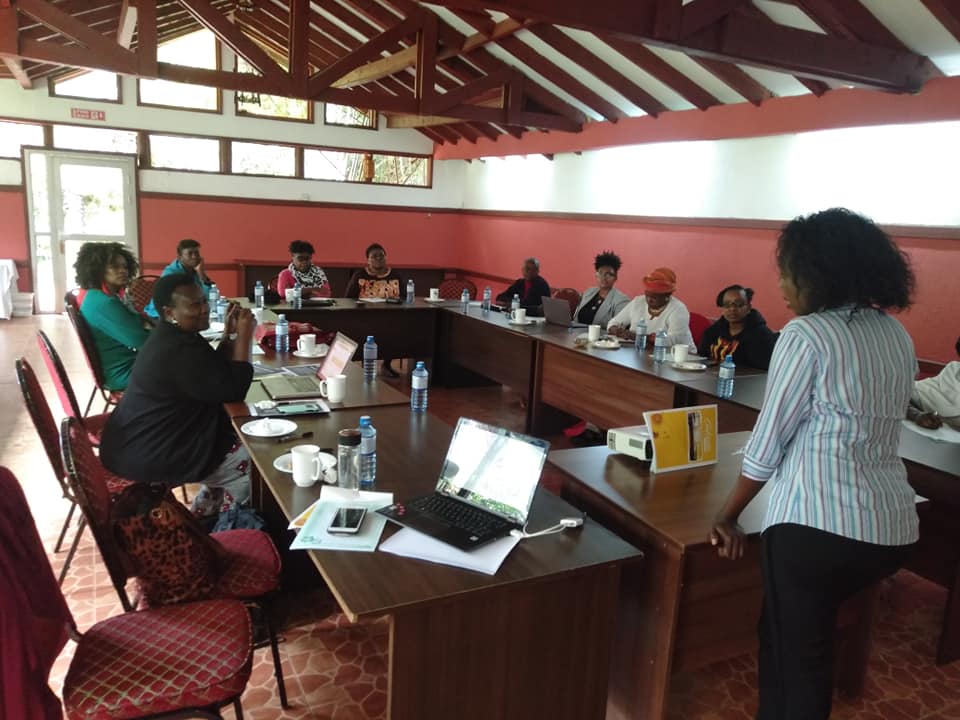
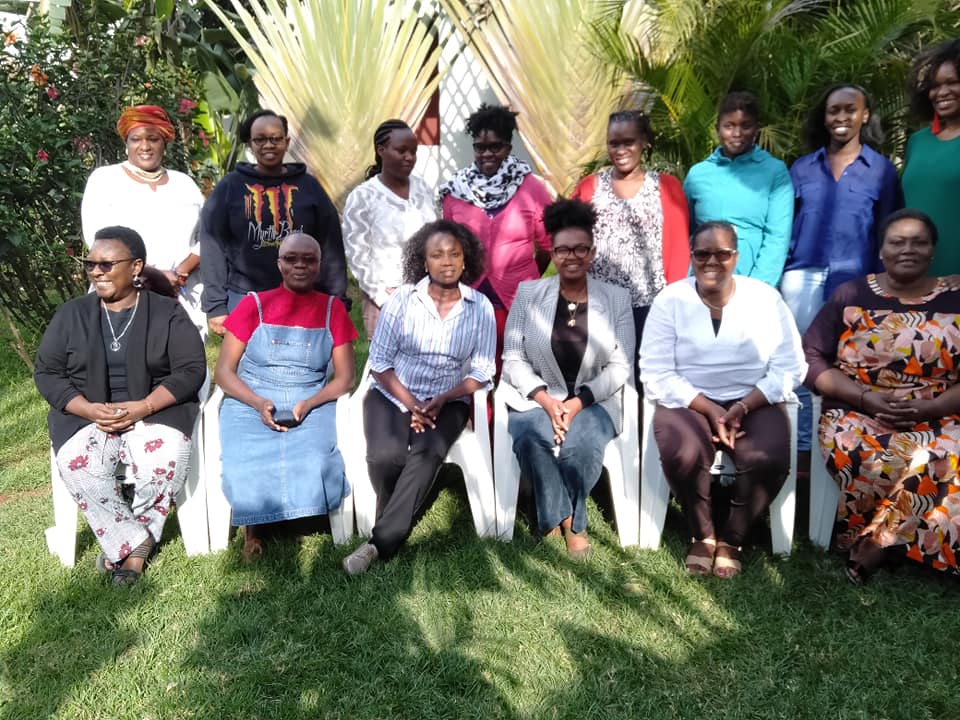
Just because it’s online does not make it any less real. Online gender-based violence has become the order of the day in Kenya. And more often than not people won’t speak about it since it’s regarded as “virtual” hence it’s not “real” violence.
But what people forget, or do not know, is that sometimes, online gender-based violence moves from online to offline. Most victims of this vice are women, especially women journalists and women politicians.
As the goal of the perpetrators is to silence women, online violence is a symptom of deep-seated gender inequality and is just one more way that women and girls are denied their human rights. It is against this backdrop that I utilised my speciality in gender digital security training to conduct the digital security training session for IAWRT-Kenya.
The highlight of the training was ‘how to create a feminist internet’, an internet where women don’t feel vulnerable being online. a safe space where women and girls are free to express themselves online without fear of being victimized. And it’s up to all of us and especially women who have a larger platform to advocate for this feminist internet. The training concluded by talking about self-care; how as journalists we should sometimes step away from the internet and take a moment to ourselves.
The Kenya chapter will work on engaging media management and policy makers to sensitize media management to the problem of online harassment that journalists face while carrying out their work. It plans to use the media to problematize and publicize the issue of journalist’s digital safety based partly around the forthcoming GMP handbook’s best practice findings.
Nepal
‘Women’s Sovereignty in Entertainment Programs’ & #MeToo advocacy for media students by Mallika Bhattarai
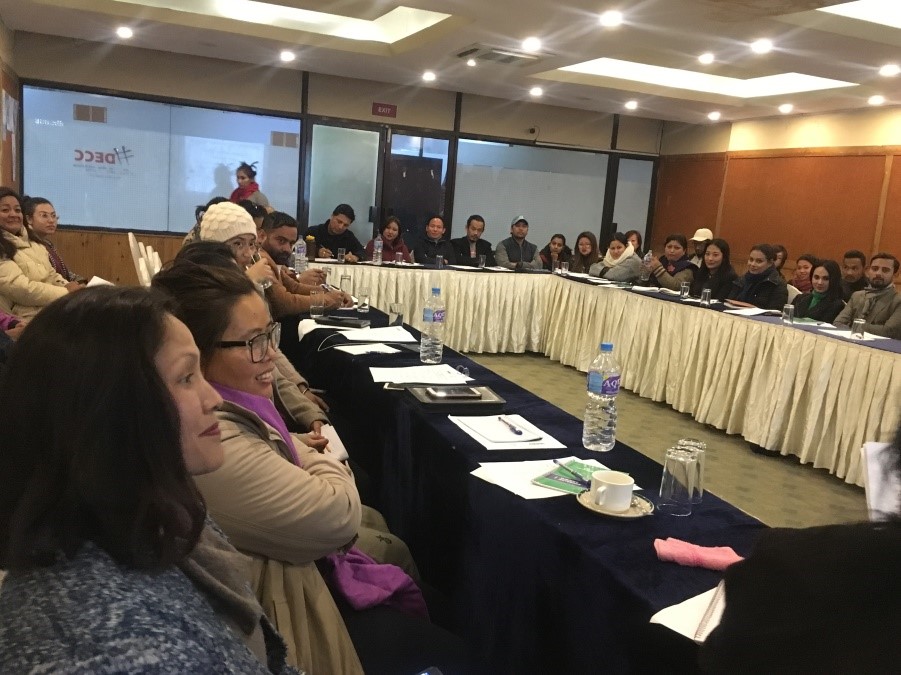 IAWRT Nepal conducted an interactive workshop on how entertainment shows are portraying female characters in mid December which was attended by directors, popular actors, script writers, producers, singers and senior media people.
IAWRT Nepal conducted an interactive workshop on how entertainment shows are portraying female characters in mid December which was attended by directors, popular actors, script writers, producers, singers and senior media people.
Senior journalist, activist and former Deputy Director of Nepal Television Deepa Gautam presented a research paper on how women are portrayed in recent popular shows and comedies on radio and Television and movies. She found that women are consistently portrayed as weak and stupid, or as an assistant to their male counterpart, who is portrayed in a position of power. Ms Gautam appealed directly to those attending, urging them to be gender sensitive and to spread gender friendly messages and action through the media they work in.
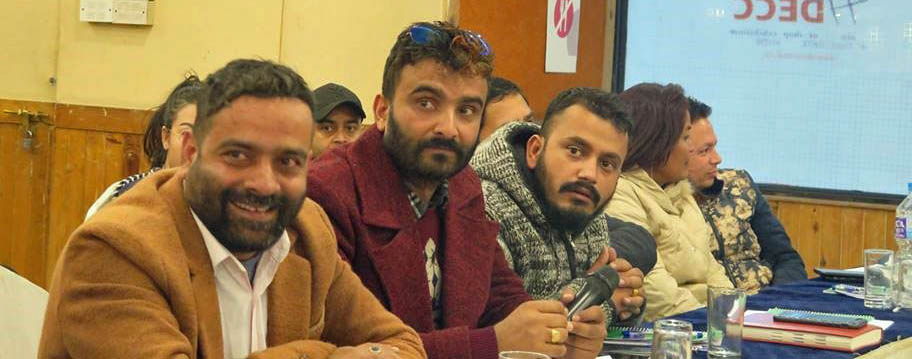 The program was facilitated by Nita Pandit, Chairperson of Sancharika Samuha, (a forum of women communicators, promoting a healthier and gender sensitive media) with Ms Montessori Rajbhandari, President of IAWRT Nepal. A number of those attending made a commitment to greater gender sensitivity on their programs after a lively discussion. We were all overwhelmed by the participants’ responses and it was a moment of pride to be a part of this great event. We hope to continue having such events that have women as the core topic and help in the empowerment of women.
The program was facilitated by Nita Pandit, Chairperson of Sancharika Samuha, (a forum of women communicators, promoting a healthier and gender sensitive media) with Ms Montessori Rajbhandari, President of IAWRT Nepal. A number of those attending made a commitment to greater gender sensitivity on their programs after a lively discussion. We were all overwhelmed by the participants’ responses and it was a moment of pride to be a part of this great event. We hope to continue having such events that have women as the core topic and help in the empowerment of women.
Be Bold for change, be bold to speak up the truth, be bold to bring out your suppressed voice
 That was the title of advocacy workshops for media students on the #MeToo campaign. held at Pentagon College and Green Field College. The aim was to make students aware of this global movement and encourage them to break the silence if they ever have had to face sexual harassment.
That was the title of advocacy workshops for media students on the #MeToo campaign. held at Pentagon College and Green Field College. The aim was to make students aware of this global movement and encourage them to break the silence if they ever have had to face sexual harassment.
Kriti Bhattarai, actress, activist, educator and media presenter, explained the history of the campaign. which took off in the United States with accusations of sexual assault against the Hollywood producer Harvey Weinstein.
 In Nepal as well, Keshav Sthapit, a former mayor of Kathmandu and a provincial minister was forced to step down, after being exposed as part of Nepal’s #MeToo movement.
In Nepal as well, Keshav Sthapit, a former mayor of Kathmandu and a provincial minister was forced to step down, after being exposed as part of Nepal’s #MeToo movement.
More than 100 students participated, and they were very keen to learn more about this movement as they shared their own experiences of facing sexual assaults in schools, temples and on public transport, especially where there are crowds. IAWRT Nepal’s GMP workshops received news coverage on national television
Philippines
Empowering women in Radyo ni Juan Mindanao newsrooms reportage and management under Duterte’s presidency By Lady Ann Salem
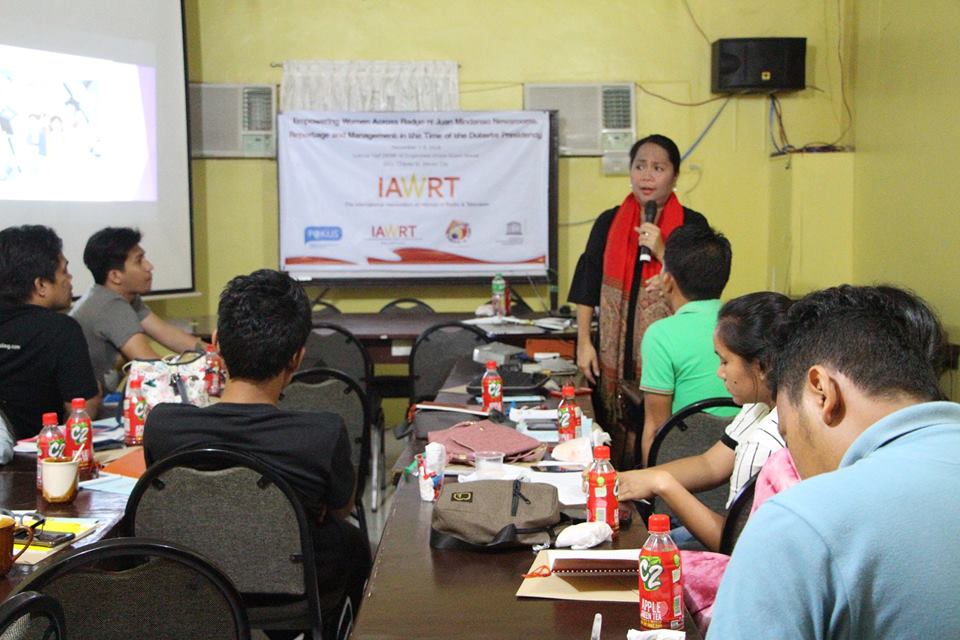
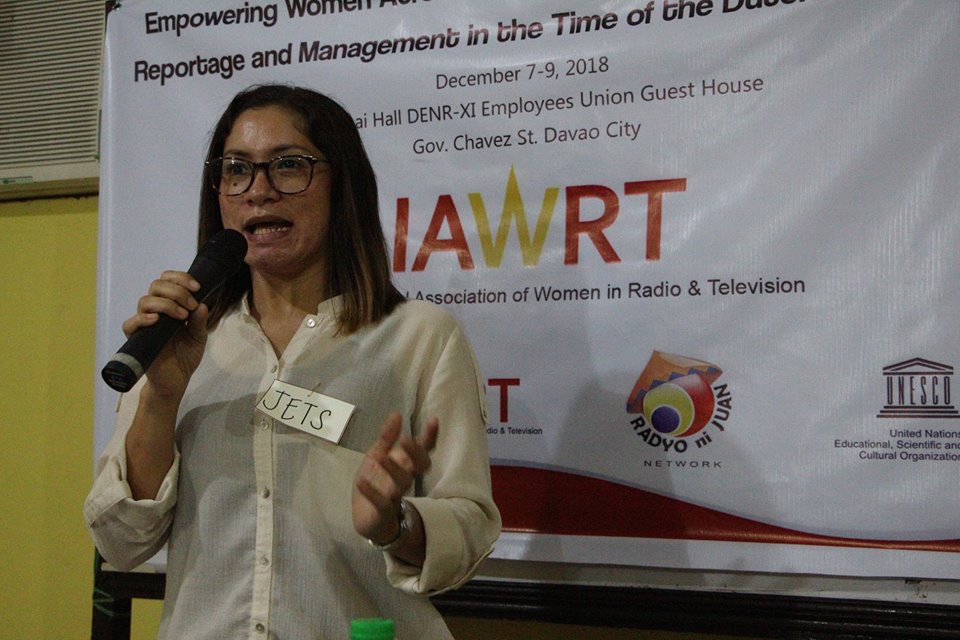 Women’s issues are people’s issues—and this is why Radyo ni Juan finds it imperative that more news airtime are allocated for women and children in its six broadcasting stations in Mindanao.
Women’s issues are people’s issues—and this is why Radyo ni Juan finds it imperative that more news airtime are allocated for women and children in its six broadcasting stations in Mindanao.
Such was the major point in the collective unities formed after the three-day training, workshop and impact assessment heldin Davao City from December 7 to 9. Radyo ni Juan’s 41 news directors, reporters, staff, managers and student observers also participated in a plenary and open forum to discuss women, gender and equality issues in its reportage and news planning priorities.
Lynda Garcia, Vice President of IAWRT Philippines Chapter, served as the keynote speaker and shared IAWRT and UNESCO’s Gender Mainstreaming Project. Jola Diones-Mamangun and Grace Uddin, IAWRT member and Radyo ni Juan Network executive vice president were facilitators.
 Germilina Lacorte, Acting Bureau Chief of Philippine Daily Inquirer Mindanao, spoke about covering women, children and adult issues under the present administration.Mario Maximo ‘Dodong’ Solis, Chief Operating Officer of Radyo ni Juan Network-Philippines, spoke about his experience on being a radio broadcaster and making a stand on people’s issues.
Germilina Lacorte, Acting Bureau Chief of Philippine Daily Inquirer Mindanao, spoke about covering women, children and adult issues under the present administration.Mario Maximo ‘Dodong’ Solis, Chief Operating Officer of Radyo ni Juan Network-Philippines, spoke about his experience on being a radio broadcaster and making a stand on people’s issues.
A solidarity night was held at the end of the activity; the participants expressed their commitment to good journalism in an unrivalled time of fake news, hate speech and troll proliferation.
|
|---|

